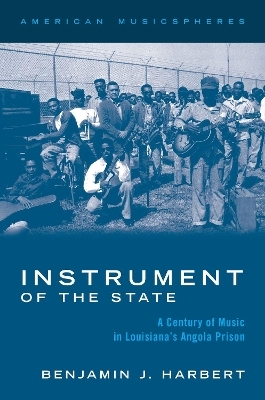
Instrument of the State
A Century of Music in Louisiana's Angola Prison
Seiten
2023
Oxford University Press Inc (Verlag)
978-0-19-751751-2 (ISBN)
Oxford University Press Inc (Verlag)
978-0-19-751751-2 (ISBN)
Louisiana State Penitentiary is one of the largest and most brutal maximum-security prisons in the United States. Built on the grounds of a former plantation, the prison is commonly referred to as "Angola" apropos of the country of origin for many of the enslaved people who inhabited the land. Despite notoriously inhumane conditions within the prison, people incarcerated at Angola have sustained a rich and dynamic musical legacy since the late nineteenth century, attracting folklorists such as John and Alan Lomax and Harry Oster. Well-known musicians including Huddie William "Lead Belly" Ledbetter, Charles Neville, and James Booker played a part in this history, in addition to a litany of others who proved vital to the prison's musical culture but for various reasons were unable to establish their careers upon release.
In Instrument of the State, author Benjamin J. Harbert interweaves oral history and archival research to show how incarcerated musicians find small but essential freedoms by performing jazz, R&B, country, gospel, rock, and fusion throughout the Twentieth Century. In doing so, he expands folkloric definitions of "prison music." considering the ways in which music manifests among the incarcerated and the prison's administration as a lens to better understand state power and the fragments of hope and joy that remain in its wake. Instrument of the State acts as an indictment of the carceral state, highlighting the many ways in which the US penal system disproportionately affects African American people through desperate profiteering of a deliberately underfunded state agency.
In Instrument of the State, author Benjamin J. Harbert interweaves oral history and archival research to show how incarcerated musicians find small but essential freedoms by performing jazz, R&B, country, gospel, rock, and fusion throughout the Twentieth Century. In doing so, he expands folkloric definitions of "prison music." considering the ways in which music manifests among the incarcerated and the prison's administration as a lens to better understand state power and the fragments of hope and joy that remain in its wake. Instrument of the State acts as an indictment of the carceral state, highlighting the many ways in which the US penal system disproportionately affects African American people through desperate profiteering of a deliberately underfunded state agency.
Benjamin J. Harbert is Associate Professor of Music and Chair of the Performing Arts Department at Georgetown University. He is the author of American Music Documentary: Five Case Studies of Ciné-Ethnomusicology, director of the documentary Follow Me Down: Portraits of Louisiana Prison Musicians, and a co-editor of The Arab Avant Garde: Music, Politics, Modernity.
Forewords by Calvin Lewis, Myron Hodges, and Wayne Kramer
List of Figures
Note to the reader
Introduction
The Book as a Multi-Movement Musical Piece
Uncovering Histories
The Musicality of Prison
A Brief Overview of Louisiana Behind Bars
1. Astonishment
2. Association
3. Politics
4. Surfaces
5. Inflection
6. Recapitulation
Notes
Bibliography
Index
| Erscheinungsdatum | 21.06.2023 |
|---|---|
| Reihe/Serie | AMERICAN MUSICSPHERES SERIES |
| Verlagsort | New York |
| Sprache | englisch |
| Maße | 159 x 236 mm |
| Gewicht | 549 g |
| Themenwelt | Kunst / Musik / Theater ► Musik ► Musiktheorie / Musiklehre |
| Kunst / Musik / Theater ► Musik ► Pop / Rock | |
| Recht / Steuern ► Strafrecht ► Kriminologie | |
| ISBN-10 | 0-19-751751-X / 019751751X |
| ISBN-13 | 978-0-19-751751-2 / 9780197517512 |
| Zustand | Neuware |
| Haben Sie eine Frage zum Produkt? |
Mehr entdecken
aus dem Bereich
aus dem Bereich
Grundbegriffe, Harmonik, Formen, Instrumente
Buch | Softcover (2021)
Philipp Reclam (Verlag)
7,80 €
globalisiertes Komponieren
Buch | Softcover (2023)
edition text + kritik (Verlag)
49,00 €


